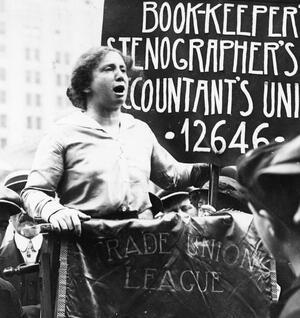Rose Schneiderman was a tiny person whose enormous passion and organizing talents changed the lives of American workers. Though only four feet nine inches tall, she could command the attention of a crowd with her powerful speaking skills whether she was standing on a street corner or a soapbox, at a lectern or a radio microphone. A fiery activist—she famously said "I was not a redhead for nothing"—she championed the rights of workers and of women throughout her life.
Rose Schneiderman was born in Poland on April 16, 1882. Her parents, Samuel and Deborah, believed strongly in education for girls (unlike many of their contemporaries) and sent Rose first to heder [religious school] and then to public school. In 1890, the family immigrated to New York City. When Samuel died two years later, Deborah did everything she could to support her children, but she was forced to place them in an orphanage temporarily. When Rose returned from the orphanage, her mother worked nights so she could attend school during the days. But when Deborah lost her job, thirteen-year-old Rose had to leave school and find work.
For three years, Schneiderman worked as a salesgirl. But department store work, while considered more respectable than factory work, was badly paid, and Schneiderman eventually became a cap maker instead. Although she earned more than as a salesgirl, wages were still low and working conditions poor, and Schneiderman soon became interested in the labor movement. Convinced that unions could improve the lot of the working class, she organized her workplace into a branch of the United Cloth Hat and Cap Makers' Union. At first skeptical that a woman could organize other workers, male union leaders were impressed by Schneiderman. She soon became the first woman elected to national office in an American labor movement.
Prior to 1900, few women belonged to unions, because male union leaders believed that women would get married, leave the workforce, and never be reliable union members. Yet women workers, too, endured long hours, low wages, and poor conditions, and they often experienced sexual harassment as well. The place of women in the labor movement was transformed by garment workers—the majority of whom were Jewish—and their 1909-1910 strike, the "Uprising of the 20,000." It remains the largest strike by women to date in the United States.
Rose Schneiderman helped pave the way for the "Uprising of the 20,000." While leading a cap makers' strike, she became involved with the New York Women's Trade Union League (NYWTUL), founded by middle-class women to help working women unionize. By 1906, she had become vice president of the NYWTUL, and in 1908 she began working as the League's chief organizer, focusing on New York City's garment workshops and the shirtwaist workers who would take to the streets the following year.
Schneiderman was also an influential figure in the activism following the tragedy of the Triangle Shirtwaist factory fire. On March 25, 1911, a fire broke out at the Triangle Shirtwaist Company factory in New York City. Although the (Jewish) owners of the company had been cited several times for violation of the city's fire safety code, they had simply paid the fines and continued operating. On the day of the fire, about 500 workers were present. Most of the escape exists were locked, in order to prevent theft and walkouts and to keep out union organizers. Firefighters did not have tall enough ladders to reach the fire, and blankets and nets held by bystanders collapsed under the weight of the many workers who jumped. Others simply burned to death inside the factory. Of the 146 victims, most were Jewish immigrant women between the ages of 16 and 23.
The scale of the tragedy provoked widespread grief and outrage. In the featured document—a speech given by Rose Schneiderman at a meeting protesting the fire—she expresses her anger that the lives of working people are not valued more and holds citizens accountable for the poor conditions of workers' lives. Responses to the fire such as Schneiderman's speech ultimately spurred the creation of more effective fire and safety regulations for the workplace.
Schneiderman's skills brought her to a statewide and then national stage. In the years before women got the right to vote, Schneiderman played a key role in the New York State suffrage campaign. In 1920, she ran for the US Senate on the Labor Party ticket. Though she did not win, her campaign brought attention to the needs of working people. She became a nationally-known figure and was both a personal friend of and political influence on Franklin and Eleanor Roosevelt, serving as the only woman on the National Labor Advisory Board and helping to shape much of New Deal legislation. In 1937, she took the post of Secretary of Labor for New York State.
Schneiderman always remained connected to her Jewish roots. Involved in Jewish causes all her life, she was particularly active during the late 1930s and 1940s in the efforts to rescue Jewish refugees from Europe and resettle them in the US and in Palestine.
Rose Schneiderman died on August 11, 1972, at age ninety. She left a lasting legacy of legislation that protects workers and clearly articulated ideals – such as comparable worth laws and government funded child care – yet to be achieved.



